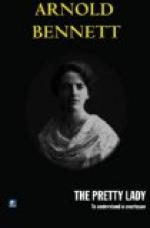Chapter
1. The promenade
2. The power
3. The flat
4. Confidence
5. Ostend
6. The Albany
7. For the empire
8. Boots
9. The club
10. The mission
11. The telegram
12. Rendezvous
13. In committee
14. Queen
15. Evening out
16. The virgin
17. Sunday afternoon
18. The mystic
19. The visit
20. Mascot
21. The leave-train
22. Getting on with the war
23. The call
24. The soldier
25. The ring
26. The return
27. The Clyde
28. Salome
29. The streets
30. The child’s arm
31. “Romance”
32. Mrs. Braiding
33. The roof
34. In the boudoir
35. Queen dead
36. Collapse
37. The invisible powers
38. The victory
39. Idyll
40. The window
41. The envoy
Chapter I
THE PROMENADE
The piece was a West End success so brilliant that even if you belonged to the intellectual despisers of the British theatre you could not hold up your head in the world unless you had seen it; even for such as you it was undeniably a success of curiosity at least.
The stage scene flamed extravagantly with crude orange and viridian light, a rectangle of bedazzling illumination; on the boards, in the midst of great width, with great depth behind them and arching height above, tiny squeaking figures ogled the primeval passion in gesture and innuendo. From the arc of the upper circle convergent beams of light pierced through gloom and broke violently on this group of the half-clad lovely and the swathed grotesque. The group did not quail. In fullest publicity it was licensed to say that which in private could not be said where men and women meet, and that which could not be printed. It gave a voice to the silent appeal of pictures and posters and illustrated weeklies all over the town; it disturbed the silence of the most secret groves in the vast, undiscovered hearts of men and women young and old. The half-clad lovely were protected from the satyrs in the audience by an impalpable screen made of light and of ascending




